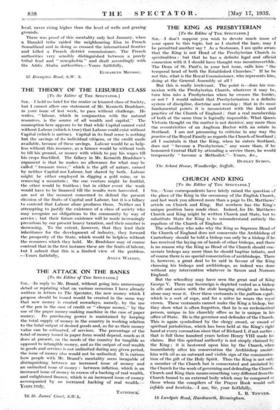THE THEORY OF THE LEISURED CLASS [To the Editor of
THE SPECTATOR.] SIR,—I hold no brief for the rentier or leisured class of Society, but I cannot allow one statement of Mr. Kenneth Bradshaw, in your issue of last week, to pass without challenge. He writes, " labour, which in conjunction with the natural resources, is the' source of all wealth and capital." The assumption here appears to be that while Capital cannot exist without Labour (which is true) that Labour could exist without Capital (which is untrue). Capital in its final sense is nothing but the- savings of its individual citizens, or the credit made available, .because of these savings. Labour would be as help- less withmit this resource, as a fanner would be without tools to till his ground, or Money with which to pay his wages till hii crops fructified. ' The fallacy in Mr. Kenneth Bradshaw's argfinient is that he makes no allowance for what may be called " treasure trove, " which is the gift of nature, earned by neither Capital nor Labour, but shared by both. Labour might be either employed in digging a gold mine, or in removing a Mountain ; the 'one venture might be fruitful, the other would be fruitless ; but in either event the work would haVe 'co be financed till the results were harvested. • I am not at the moment concerned to defend the present division of the fruits of Capital and Labour, but it is a fallacy to contend that Labour alone produces them. Neither am I attempting to justify the existence of a class of society who may recognize no obligations to the community by • way of service ; but their future existence will be made increasingly precarious by our present heavy taxation, and their number is To the extent, however, that they lend their inheritance for the development of industry, they forward the prosperity of the State, which would be helpless without the resources which they hold. Mr. Bradshaw may of course contend that in the first instance these are the fruits of labour, but I submit that this is a limited view of the problem. —Yours faithfully,
ANGUS WATSON.










































 Previous page
Previous page